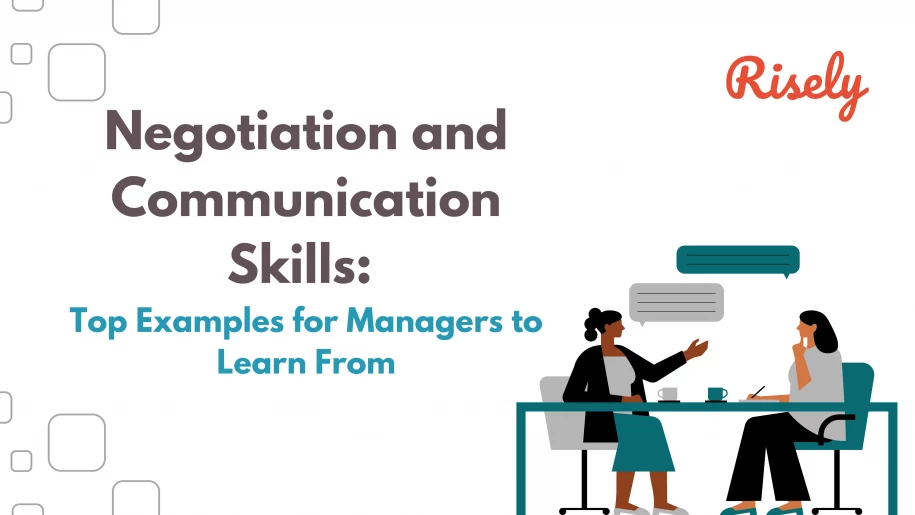Negotiation and Communication Skills: Top Examples for Managers to Learn From
Are you ready to master the art of negotiation? Can you effectively communicate your ideas, needs, and concerns in the workplace? In today’s dynamic and fast-paced professional landscape, having strong negotiation and communication skills is the key to success. Imagine confidently navigating salary negotiations, resolving conflicts with ease, and building productive relationships with colleagues and clients. These are just a few examples of how negotiation and communication skills can propel your career forward. In this blog, we will dive deep into negotiation and communication skills, exploring their importance, examples, and strategies for improvement. Whether you’re a seasoned professional or just starting, there’s always room to enhance your abilities in these critical areas. Let’s explore!How do Negotiation and Communication Skills Relate?
Negotiation and communication skills are closely intertwined and play a significant role in achieving successful outcomes. Effective communication is fundamental to negotiation, allowing parties to express their interests, concerns, and viewpoints clearly. Without strong communication skills, misunderstandings can arise, leading to conflicts or failed negotiations. Communication skills such as active listening, empathy, and assertiveness enable negotiators to understand the needs and perspectives of others, fostering a cooperative atmosphere. Open and transparent communication promotes trust, collaboration, and exploring mutually beneficial solutions. Additionally, effective communication helps negotiators manage emotions and maintain professionalism, even in tense or high-pressure situations. On the other hand, negotiation skills complement communication by providing frameworks, strategies, and techniques for navigating conflicts, finding common ground, and reaching agreements. Negotiation skills involve analyzing situations, setting goals, bargaining, problem-solving, and making compromises. These skills enhance communication by providing structure, focus, and direction to discussions. Ultimately, the synergy between negotiation and communication skills enables individuals to build productive relationships, resolve conflicts, and achieve win-win outcomes. By developing and integrating both skill sets, negotiators can effectively navigate complex scenarios, foster collaboration, and optimize results in various personal and professional contexts.Other Interesting Reads
What is the Role of Communication in Negotiation?
As you would know, effective communication is crucial in negotiation as it is the cornerstone for understanding, building trust, and reaching mutually beneficial agreements. Clear and concise communication helps parties articulate their interests, concerns, and goals, accurately conveying their viewpoints. Active listening enables negotiators to comprehend the perspectives and needs of the other party, fostering empathy and creating a basis for finding common ground. Additionally, effective communication allows for exploring creative solutions and facilitates problem-solving during impasses or disagreements. By fostering transparent and open communication, negotiators can build rapport, manage emotions, and maintain a constructive atmosphere, leading to successful negotiations and long-lasting agreements.How to Improve Negotiation and Communication Skills?
Improving negotiation and communication skills requires consistent practice and a proactive approach. Here are some strategies that will help you in improving these skills so that you can become your best at negotiations and workplace communication:- Active Listening: Practice active listening by giving your full attention to others, maintaining eye contact, and paraphrasing to ensure understanding. This helps build rapport, demonstrates respect, and fosters effective communication.
- Emotional Intelligence: Develop emotional intelligence in communication by understanding and managing your own emotions, as well as recognizing and empathizing with the emotions of others. This helps establish trust and facilitates better communication and negotiation outcomes.
- Role-Playing and Simulations: Practice negotiation scenarios in role-playing exercises or simulations. This allows you to refine your communication techniques, problem-solving skills, and adaptability.
- Reflective Practice: Regularly reflect on your negotiation and communication experiences. Analyze what worked well and areas for improvement. Seek feedback from others and identify areas where you can enhance your skills.
- Continuous Learning: Stay updated on the latest trends, research, and best practices in negotiation and communication. Read books, attend seminars, and follow thought leaders to expand your knowledge and gain new perspectives.
- Feedback and Mentorship: Seek feedback from colleagues, mentors, or coaches who can provide constructive criticism and guidance. A mentor who shares their experiences and offers advice can greatly accelerate your growth.
- Cultural Awareness: Develop cultural sensitivity and awareness to communicate and negotiate with individuals from diverse backgrounds effectively. Understand cultural nuances, norms, and communication styles to avoid misunderstandings.

Examples of Sound Negotiation and Communication Skills
Salary Negotiation Negotiation and communication skills come into play when seeking a raise or discussing compensation, effectively presenting your achievements and value to the company, actively listening to your employer’s perspective, and finding a mutually beneficial agreement require strong negotiation and communication abilities. Conflict Resolution Conflicts may arise between colleagues or teams in the workplace. By utilizing negotiation and communication skills, individuals can engage in open dialogue, actively listen to each other’s concerns, and collaboratively seek resolutions that address everyone’s needs. Check out “Principles of effective communication: A basic guide for better dialogue”. Project Planning and Management Negotiation and communication skills are essential when coordinating and assigning tasks within a project team. Negotiating timelines, resource allocation, and individual responsibilities requires effective communication to ensure clarity, understanding, and agreement among team members. Client and Vendor Negotiations Interacting with clients or vendors often involves negotiation to establish terms, pricing, and agreements. Effective communication helps convey expectations, negotiate terms that meet both parties’ needs, and build strong professional relationships. Performance Reviews During performance evaluations, negotiation and communication skills can be utilized to discuss career development, set goals, and provide constructive feedback. Effectively articulating strengths and areas for improvement and working collaboratively on performance plans contribute to employee growth and job satisfaction. Change Management Negotiation and communication skills are crucial when implementing organizational changes to address employee concerns, gain buy-in, and manage potential resistance. Clear and empathetic communication and negotiation techniques can help navigate change and mitigate conflicts. These examples illustrate how negotiation and communication skills are utilized across various workplace scenarios to build relationships, resolve conflicts, and achieve desired outcomes. As a result, individuals can contribute to a productive and positive work environment by honing these skills.Conclusion
The importance of negotiation and communication skills in the workplace cannot be overstated. These skills are essential for building relationships, resolving conflicts, and achieving successful outcomes. Effective communication lays the foundation for understanding and collaboration, while negotiation skills provide the tools to navigate complex situations and find mutually beneficial solutions. By continuously developing and honing these skills, individuals can enhance their professional effectiveness, improve teamwork, and foster a positive work environment. Whether it’s salary negotiations, conflict resolution, project management, or client interactions, communicating effectively and negotiating skillfully empowers individuals to navigate challenges, drive positive change, and achieve success in their careers. Sign up for Risely to learn more about communication and negotiation skills for resolving conflicts and decision-making approaches.Do you use your negotiation and communication skills effectively? Find out now.
Take the free persuasion skill assessment now to get detailed insights and guidelines to master communication.
FAQs
Why are communication skills important in negotiation?
Communication skills are vital in negotiation as they enable effective expression of ideas, active listening, and understanding of others’ perspectives, fostering collaboration, trust, and successful resolution of conflicts.
What are the 5 communication and negotiation strategies?
The five communication and negotiation strategies include active listening, clear and concise communication, empathy, assertiveness, and problem-solving, all of which contribute to effective communication and successful negotiations.
How do you develop communication and negotiation skills?
Develop communication and negotiation skills by seeking training and education, practicing active listening, enhancing emotional intelligence, engaging in role-playing exercises, reflecting on experiences, and seeking feedback and mentorship.
Other Related Blogs
Executive Communication Coach: When And How To Choose
Executive Communication Coach: When And How To Choose Good communication is a must for professional success. After all, half of people management is all about saying the right things in…
5 Unique Benefits Of Online Leadership Coaching
5 Unique Benefits Of Online Leadership Coaching Remember the days of leadership development being confined to a stuffy conference room filled with flipcharts and generic advice? Yeah, those days are…
Performance Management Training: Empowering Managers To Manage Better
Performance Management Training: Empowering Managers To Manage Better Remember that feeling of dread when you knew performance review season was rolling around? Yeah, us, too. For many employees, performance reviews…
Manager Development Goals And How To Reach Them: Opportunities And Areas To Focus On
Manager Development Goals And How To Reach Them: Opportunities And Areas To Focus On You’ve meticulously crafted a development program for your high-potential employees, but their managers just aren’t on…


